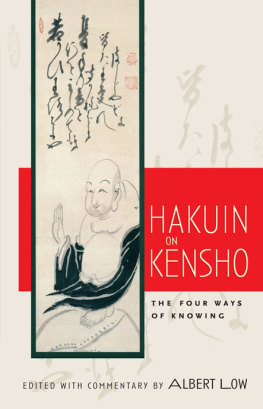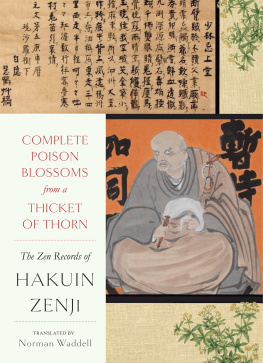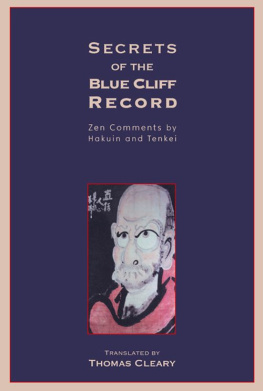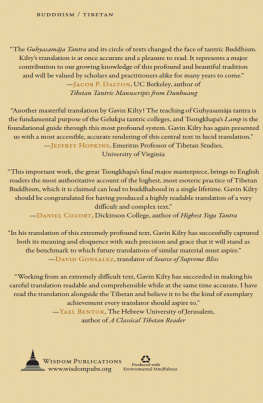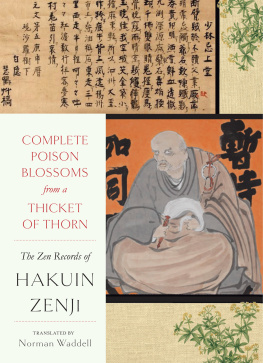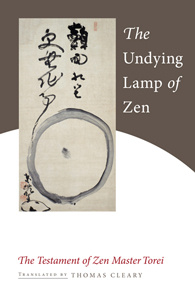An indispensible aid to the practice of Rinzai Zen and an accessible entree to the Zen experience in general. Torei is a compelling guide; his tone is energetic, no nonsense, and full of personality.
Sweeping Zen blog
ABOUT THE BOOK
The Undying Lamp of Zen is a pure and powerful distillation of Zen doctrine and practice written by Torei Enji (17211792), a Zen master and artist. Torei was best known as one of two genius assistants to Hakuin Ekaku, a towering figure in Zen Buddhism who revitalized the Rinzai school, which focuses on koan practice. Torei was responsible for much of the advanced work of Hakuins later disciples and also helped systemize Hakuins Zen teachings. The Undying Lamp of Zen includes a range of principles and practices, from the most elementary to the most advanced. It is an indispensable aid to the practice of Rinzai Zen, while also providing tested traditional techniques for public access to Zen experience.
Premier translator Thomas Cleary provides a thorough introduction and illuminating footnotes throughout, and his masterful translation lets Toreis distinctive voice shine through; Torei is energetic, no-nonsense, and full of personality. No other English translations of this classic are available and Zen aficionados will want to add this to their collection.
THOMAS CLEARY holds a PhD in East Asian Languages and Civilizations from Harvard University and a JD from the University of California, Berkeley Law. He is widely known for his translations of seminal classics in Taoism, Buddhism, Confucianism, military science, and martial arts.
Sign up to learn more about our books and receive special offers from Shambhala Publications.

Or visit us online to sign up at shambhala.com/eshambhala.
T HE U NDYING L AMP OF Z EN
The Testament of Zen Master Torei
TRANSLATED AND EDITED BY
T HOMAS C LEARY

S HAMBHALA
Boston & London
2011
S HAMBHALA P UBLICATIONS , I NC .
Horticultural Hall
300 Massachusetts Avenue
Boston, Massachusetts 02115
www.shambhala.com
2010 by Thomas Cleary
Cover art: Calligraphy by Torei, courtesy of the Gitter-Yelen Collection.
Cover design: Deborah Hodgdon
All rights reserved. No part of this book may be reproduced in any form or by any means, electronic or mechanical, including photocopying, recording, or by any information storage and retrieval system, without permission in writing from the publisher.
Library of Congress Cataloging-in-Publication Data
Torei, 17211792.
[Shumon mujintoron. English]
The undying lamp of Zen: the testament of Zen master Torei/translated and edited by Thomas Cleary.1st ed.
p. cm.
Includes bibliographical references.
eISBN 978-0-8348-2313-6
ISBN 978-1-59030-792-2
1. Zen BuddhismDoctrinesEarly works to 1800. 2. Rinzai (Sect)DoctrinesEarly works to 1800. I. Cleary, Thomas F., 1949 II. Title.
BQ9268.T67313 2010
294.3927dc22
2010008666
CONTENTS
The Undying Lamp of Zen is a testament of one of the most eminent Zen masters of premodern Japan, Torei Enji (172192), written in anticipation of his imminent death. Because of the circumstances of its composition, it is an exceptionally explicit statement of Zen Buddhist doctrine and practice.
Torei became a monk at an early age and studied Zen under the guidance of several teachers, including Kogetsu (16671751), a distinguished master of the Rinzai sect of Zen. Torei first met Kogetsu when he was only five years old, but the personality of this master already inspired his interest in Zen even at this early age. Ordained at the age of nine, Torei went traveling for study when he was eighteen. After some experience of Zen, on the advice of Kogetsu he called on the redoubtable Hakuin (16851768), a towering figure who revitalized Rinzai Zen, particularly the study of the Zen koan.
Hakuin had many enlightened disciples, but Torei is traditionally accorded special status as one of two shinsoku or genius assistants of Hakuin. Torei was responsible for much of the advanced work of Hakuins later disciples and also contributed considerably to the systematization of Hakuins Zen teaching.
After his Zen enlightenment was tested and acknowledged by the notoriously rigorous Hakuin, Toreis physical health broke down repeatedly, ultimately to a point where he was pronounced incurable by physicians. As he himself explains in his own preface, this was when and why he wrote The Undying Lamp of Zen. At the time he was barely thirty years old.
The Undying Lamp of Zen affords a rare glimpse into the school of Hakuin as it was in the masters own time, conveying the intensity and fervor of revival as well as the practical precision of technical expertise. Insisting on the experience of enlightenment, and then even more on progressive practice after enlightenment, Torei provides accessible methods for both parts of the process.
Teaching Zen according to Ekayana One Vehicle Buddhist principles, and in answer to the needs of his own time, Torei shows how to reunify the diverse Buddhist schools experientially while retaining the advantages of their specializations. Torei also reconciles Buddhism with the other religions and philosophies of his cultureanother Ekayana practicein this case Shinto, Confucianism, and Taoism.
As it was intended to be a final testament, The Undying Lamp of Zen represents a range of principles and practices rarely found assembled in one place, from the most elementary to the most advanced. It is an indispensable aid to the practice of Rinzai Zen, while also providing tested traditional techniques for public access to Zen experience.
In a further sense, this treatise is a testimony to the power of vowing, an essential ingredient of Toreis teaching and practice, by which he recovered and unleashed the massive willpower and expansive energy that would heal him and propel him for another forty years of dedication, to be diffused throughout the school even after his death.
The founding of the Japanese Zen lineage to which Hakuin and Torei refer their spiritual heritage is traced back to Daio (12351308), who learned his Zen in Song-dynasty China. Hakuins branch of this lineage became obscure in the sixteenth century, with nothing being known of a number of the masters save their names. This changed with the emergence of Master Gudo (15771661) as the teacher of the emperor. Very little is known of Gudos work, but he acknowledged numerous spiritual successors. One among them, a barely literate layman, left home in his fifties after having practiced Zen under Gudos tutelage for thirty years. This was Munan (160376), who would become the spiritual grandfather of Hakuin and the ancestor of modern Rinzai Zen.
Munan left a relatively rich record in simple vernacular, providing explicit instructions in the essential processes of Zen. The pivotal issues that preoccupied Hakuin and Torei in their efforts to revitalize Zen can already be seen in the work of Munan. He was a layman for most of his life, and when he left home and became a monk, even though he was a recognized successor of a national teacher (a title for teachers of emperors), he had nothing to do with monastic careerism but lived a life of simple austerity, sustained by richness of spirituality.
Munans teachings place great emphasis on the realization of satori, or Zen enlightenment. This is a common characteristic of Rinzai Zen, but the emphasis becomes particularly marked under certain historical conditions, and also particular psychological conditions, even to the point where satori may be taken to be an end, rather than a means. In response to this trend, Munan also stressed the pitfalls in overestimating satori , and the consequent importance of maturation and development in the aftermath of the awakening experience. This concerted attention to the special requirements of each phase of Zen practice was to continue in Munans lineage, becoming particularly prominent in the work of Hakuin, and even more so in the teaching of Torei. According to Munan:
Next page
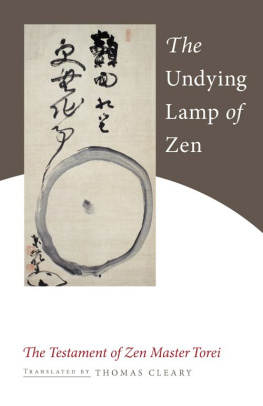
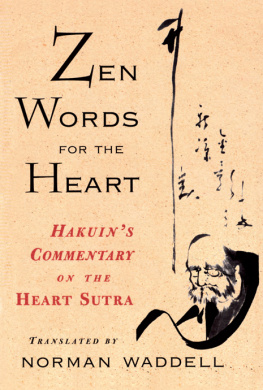
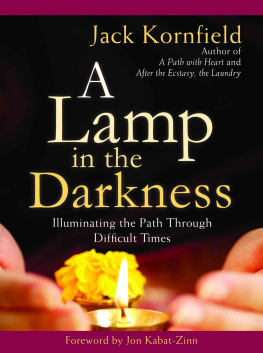
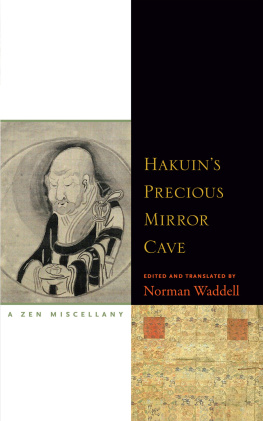

![Dalaï Lama XIV. - An introduction to Buddhism: [teachings on the Four noble truths, The eight verses on training the mind and the Lamp for the path to enlightenment]](/uploads/posts/book/207935/thumbs/dala-lama-xiv-an-introduction-to-buddhism.jpg)
